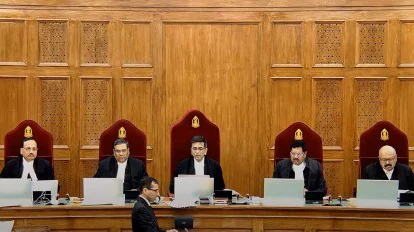Jahanvi Agarwal
The Supreme Court of India, on 25th September 2024, emphasized the importance of judicial restraint and the need for judges to refrain from making comments that could be perceived as misogynistic or biased against any community. This statement came in response to controversial remarks made by a Karnataka High Court judge, Justice V Srishanandan, who referred to a Muslim-majority locality in Bengaluru as “Pakistan” during a hearing. The judge had also made inappropriate remarks toward a female lawyer in a separate matrimonial case.
Chief Justice of India (CJI) DY Chandrachud, heading a five-judge bench that included Justices Sanjiv Khanna, BR Gavai, Surya Kant, and Hrishikesh Roy, was particularly critical of the judge’s remarks, stating, “You can’t call any part of the territory of India as ‘Pakistan.’ It is fundamentally contrary to the territorial integrity of the nation.”
Despite the gravity of the remarks, the Supreme Court decided not to take any further punitive action. This was because Justice Srishanandan expressed regret for his comments in open court, following the Supreme Court’s intervention and the viral circulation of the videos capturing his remarks. However, the Court made it clear that such incidents highlight the importance of maintaining judicial decorum in an era where court proceedings are widely reported by electronic media.
In its observations, the bench underscored how “casual observations may well reflect a certain degree of individual bias, particularly when they are likely to be perceived as being directed against a particular gender or community.” The judges further noted that, in a diverse society like India, courts must be “careful not to make comments in the course of judicial proceedings which may be construed as being misogynistic or prejudicial to any segment of our society.” This statement highlights the responsibility of the judiciary to foster a perception of fairness and impartiality, ensuring that no group feels alienated by comments from the bench.
The Court’s message was clear: perceptions of justice are as important as the actual delivery of justice. The bench stressed that “the heart and soul of judging is the need to be impartial and fair” and that judges must be guided solely by the Constitution’s values. CJI Chandrachud stated, “The only values which must guide judicial decision-making are those which are enshrined in the Constitution of India.”
While the Court chose to conclude the proceedings, it reiterated that in this digital age, where court statements are rapidly disseminated, all stakeholders in the legal system must be cautious and thoughtful about their words and actions. The Court’s decision not only addressed the specific comments made but also sent a broader message about the critical role of neutrality and restraint in the judiciary.
Case Name: In Re: Remarks By High Court Judge During Court Proceedings.
Case Number: SMW (C) No(s). 9/2024
Bench: Chief Justice of India (CJI) DY Chandrachud, Justices Sanjiv Khanna, BR Gavai, Surya Kant, and Hrishikesh Roy.

